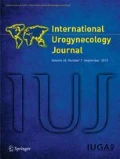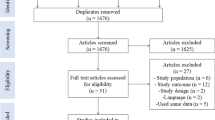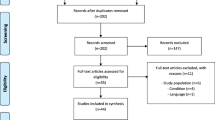Abstract
Introduction and hypothesis
Postpartum urinary retention (PUR) is a well-known condition after childbirth. Often clinicians assume that this condition is transient, either through belief or by not being aware that its occurrence as measurement of post-void residual volume (PVRV) is often not routine. However, long lasting urinary retention is a serious condition that needs management in order to prevent urogenital tract morbidity. By performing a systematic review of the adverse effects of PUR and management of this condition, we aimed to identify the necessity of diagnosing this condition in the puerperium and to evaluate whether treatment is required.
Methods
We searched for all studies on PUR in OVID MEDLINE, OVID EMBASE, and ongoing Trial registers. Two reviewers independently screened and extracted the data.
Results
Twenty-four papers were included in this review. Limited data on adverse effects demonstrate potential morbidities, like micturition symptoms and sporadically spontaneous bladder ruptures, related to PUR.
Conclusions
Based on current literature, evidence stating that PUR is harmless is lacking. Future research should focus on management strategies for overt PUR and the long-term consequences of covert PUR. Until these results are available, clinicians should be aware of the potential consequences and therefore keep trying to identify patients at risk of PUR and patients with the actual condition.

Similar content being viewed by others
Abbreviations
- PUR:
-
Postpartum urinary retention
- PVRV:
-
Post-void residual volume
- CIC:
-
Clean intermittent catheterization
References
Yip SK, Brieger G, Hin LY, Chung T (1997) Urinary retention in the post-partum period. The relationship between obstetric factors and the post-partum post-void residual bladder volume. Acta Obstet Gynecol Scand 76:667–672
Andolf E, Iosif CS, Jorgensen C, Rydhstrom H (1994) Insidious urinary retention after vaginal delivery: prevalence and symptoms at follow-up in a population-based study. Gynecol Obstet Investig 38:51–53
Hee P, Lose G, Beier-Holgersen R, Engdahl E, Falkenlove P (1992) Postpartum voiding in the primiparous after vaginal delivery. Int Urogynecol J 3:95–99
Kekre AN, Vijayanand S, Dasgupta R, Kekre N (2011) Postpartum urinary retention after vaginal delivery. Int J Gynaecol Obstet 112:112–115
Glavind K, Bjork J (2003) Incidence and treatment of urinary retention postpartum. Int Urogynecol J Pelvic Floor Dysfunct 14:119–121
Ching-Chung L, Shuenn-Dhy C, Ling-Hong T, Ching-Chang H, Chao-Lun C, Po-Jen C (2002) Postpartum urinary retention: assessment of contributing factors and long-term clinical impact. Aust N Z J Obstet Gynaecol 42:365–368
Liang CC, Chang SD, Chang YL, Chen SH, Chueh HY, Cheng PJ (2007) Postpartum urinary retention after cesarean delivery. Int J Gynaecol Obstet 99:229–232
Rizvi RM, Khan ZS, Khan Z (2005) Diagnosis and management of postpartum urinary retention. Int J Gynaecol Obstet 91:71–72
Hakvoort RA, Dijkgraaf MG, Burger MP, Emanuel MH, Roovers JP (2009) Predicting short-term urinary retention after vaginal prolapse surgery. Neurourol Urodyn 28:225–228
Fitzgerald MP, Kulkarni N, Fenner D (2000) Postoperative resolution of urinary retention in patients with advanced pelvic organ prolapse. Am J Obstet Gynecol 183:1361–1363
Sokol AI, Jelovsek JE, Walters MD, Paraiso MF, Barber MD (2005) Incidence and predictors of prolonged urinary retention after TVT with and without concurrent prolapse surgery. Am J Obstet Gynecol 192:1537–1543
Smorgick N, DeLancey J, Patzkowsky K, Advincula A, Song A, As-Sanie S (2012) Risk factors for postoperative urinary retention after laparoscopic and robotic hysterectomy for benign indications. Obstet Gynecol 120:581–586
Stallard S, Prescott S (1988) Postoperative urinary retention in general surgical patients. Br J Surg 75:1141–1143
Mustonen S, Ala-Houhala IO, Tammela TL (2001) Long-term renal dysfunction in patients with acute urinary retention. Scand J Urol Nephrol 35:44–48
Mustonen S, Ala-Houhala IO, Turjanmaa V, Tammela TL (2001) Effect of acute urinary retention on glomerular filtration rate. Clin Nephrol 56:81–82
Abe T, Shinno Y, Kawakura K, Moriya K (2000) Acute renal failure occurring from urinary retention due to a mullerian duct cyst. Int J Urol 7:69–71
Lewis JM, Yalla SV, Stanitski KE, Sullivan MP (2012) Spectrum of urodynamic abnormalities and renal function changes in adult men with non-neurogenic urinary retention. Neurourol Urodyn 31:544–548
Bross S, Schumacher S, Scheepe JR, Zendler S, Braun PM, Alken P, Junemann K (1999) Effects of acute urinary bladder overdistension on bladder response during sacral neurostimulation. Eur Urol 36:354–359
Madersbacher H, Cardozo L, Chapple C, Abrams P, Toozs-Hobson P, Young JS, Wyndaele JJ, De WS, Campeau L, Gajewski JB (2012) What are the causes and consequences of bladder overdistension? ICI-RS 2011. Neurourol Urodyn 31:317–321
Muellner S (1938) Physiological bladder changes during pregnancy and the puerperium. J Urol 41:691
Iosif S, Ingemarsson I, Ulmsten U (1980) Urodynamic studies in normal pregnancy and in puerperium. Am J Obstet Gynecol 137:696–700
Snooks SJ, Swash M, Mathers SE, Henry MM (1990) Effect of vaginal delivery on the pelvic floor: a 5-year follow-up. Br J Surg 77:1358–1360
Liang CC, Lin YH, Chen TC, Chang SD (2014) How antepartum and postpartum acute urinary retention affects the function and structure of the rat bladder. Int Urogynecol J doi:10.1007/s00192-013-2320-7
Zaki MM, Pandit M, Jackson S (2004) National survey for intrapartum and postpartum bladder care: assessing the need for guidelines. BJOG 111:874–876
Liberati A, Altman DG, Tetzlaff J, Mulrow C, Gotzsche PC, Ioannidis JP, Clarke M, Devereaux PJ, Kleijnen J, Moher D (2009) The PRISMA statement for reporting systematic reviews and meta-analyses of studies that evaluate health care interventions: explanation and elaboration. J Clin Epidemiol 62:e1–e34
Von Elm E, Altman DG, Egger M, Pocock SJ, Gotzsche PC, Vandenbroucke JP (2008) The Strengthening the Reporting of Observational Studies in Epidemiology (STROBE) statement: guidelines for reporting observational studies. J Clin Epidemiol 61:344–349
Olofsson CI, Ekblom AO, Ekman-Ordeberg GE, Irestedt LE (1997) Post-partum urinary retention: a comparison between two methods of epidural analgesia. Eur J Obstet Gynecol Reprod Biol 71:31–34
Foon R, Toozs-Hobson P, Millns P, Kilby M (2010) The impact of anesthesia and mode of delivery on the urinary bladder in the postdelivery period. Int J Gynaecol Obstet 110:114–117
Liang CC, Chang SD, Wong SY, Chang YL, Cheng PJ (2010) Effects of postoperative analgesia on postpartum urinary retention in women undergoing cesarean delivery. J Obstet Gynaecol Res 36:991–995
Lee J (1961) Management of postpartum urinary retention. Obstet Gynecol 17:464–471
Sherline DM, DANFORTH DN (1962) Effects of labor, delivery, and anesthesia on postpartum bladder function. Obstet Gynecol 19:808–813
Teo R, Punter J, Abrams K, Mayne C, Tincello D (2007) Clinically overt postpartum urinary retention after vaginal delivery: a retrospective case–control study. Int Urogynecol J Pelvic Floor Dysfunct 18:521–524
Fedorkow DM, Drutz HP, Mainprize TC (1990) Characteristics of patients with postpartum urinary retention. Int Urogynecol J 1:136–138
Carley ME, Carley JM, Vasdev G, Lesnick TG, Webb MJ, Ramin KD, Lee RA (2002) Factors that are associated with clinically overt postpartum urinary retention after vaginal delivery. Am J Obstet Gynecol 187:430–433
Musselwhite KL, Faris P, Moore K, Berci D, King KM (2007) Use of epidural anesthesia and the risk of acute postpartum urinary retention. Am J Obstet Gynecol 196:472–475
Buchanan J, Beckmann M (2014) Postpartum voiding dysfunction: identifying the risk factors. Aust N Z J Obstet Gynaecol 54:41–45
Groutz A, Gordon D, Wolman I, Jaffa A, Kupferminc MJ, Lessing JB (2001) Persistent postpartum urinary retention in contemporary obstetric practice. Definition, prevalence and clinical implications. J Reprod Med 46:44–48
Groutz A, Levin I, Gold R, Pauzner D, Lessing JB, Gordon D (2011) Protracted postpartum urinary retention: the importance of early diagnosis and timely intervention. Neurourol Urodyn 30:83–86
Humburg J, Holzgreve W, Hoesli I (2007) Prolonged postpartum urinary retention: the importance of asking the right questions at the right time. Gynecol Obstet Investig 64:69–71
Chai AH, Wong T, Mak HL, Cheon C, Yip SK, Wong AS (2008) Prevalence and associated risk factors of retention of urine after caesarean section. Int Urogynecol J Pelvic Floor Dysfunct 19:537–542
Weissman A, Grisaru D, Shenhav M, Peyser RM, Jaffa AJ (1995) Postpartum surveillance of urinary retention by ultrasonography: the effect of epidural analgesia. Ultrasound Obstet Gynecol 6:130–134
Van Os AF, Van der Linden PJ (2006) Reliability of an automatic ultrasound system in the post partum period in measuring urinary retention. Acta Obstet Gynecol Scand 85:604–607
Demaria F, Amar N, Biau D, Fritel X, Porcher R, Amarenco G, Madelenat P, Benifla JL (2004) Prospective 3D ultrasonographic evaluation of immediate postpartum urine retention volume in 100 women who delivered vaginally. Int Urogynecol J Pelvic Floor Dysfunct 15:281–285
Ismail SI, Emery SJ (2008) The prevalence of silent postpartum retention of urine in a heterogeneous cohort. J Obstet Gynaecol 28:504–507
Ramsay IN, Torbet TE (1993) Incidence of abnormal voiding parameters in the immediate postpartum period. Neurourol Urodyn 12:179–183
Lee SN, Lee CP, Tang OS, Wong WM (1999) Postpartum urinary retention. Int J Gynaecol Obstet 66:287–288
Liang CC, Wong SY, Tsay PT, Chang SD, Tseng LH, Wang MF, Soong YK (2002) The effect of epidural analgesia on postpartum urinary retention in women who deliver vaginally. Int J Obstet Anesth 11:164–169
Yip SK, Sahota D, Chang AM, Chung TK (2002) Four-year follow-up of women who were diagnosed to have postpartum urinary retention. Am J Obstet Gynecol 187:648–652
Jeffery TJ, Thyer B, Tsokos N, Taylor JD (1990) Chronic urinary retention postpartum. Aust N Z J Obstet Gynaecol 30:364–366
Humburg J, Troeger C, Holzgreve W, Hoesli I (2011) Risk factors in prolonged postpartum urinary retention: an analysis of six cases. Arch Gynecol Obstet 283:179–183
Watson WJ (1991) Prolonged postpartum urinary retention. Mil Med 156:502–503
Duenas-Garcia OF, Rico H, Gorbea-Sanchez V, Herrerias-Canedo T (2008) Bladder rupture caused by postpartum urinary retention. Obstet Gynecol 112:481–482
Gaikwad PR, Sharma S, Kanitkar SV, Kachane T (2011) Spontaneous rupture of the urinary bladder in the puerperium. J Obstet Gynecol India 61:208–209
Png KS, Chong YL, Ng CK (2008) Two cases of intraperitoneal bladder rupture following vaginal delivery. Singapore Med J 49:327–329
Roberts C, Oligbo N, Swinhoe J (1996) Spontaneous bladder rupture following normal vaginal delivery: a postpartum emergency. Br J Obstet Gynaecol 103:381–382
Kekre AN, Kekre N, Nath V, Seshadri L (1997) Spontaneous rupture of the urinary bladder in the puerperium. Aust N Z J Obstet Gynaecol 37:473–474
Wandabwa J, Otim T, Kiondo P (2004) Spontaneous rupture of bladder in puerperium. Afr Health Sci 4:138–139
Mulder F, Schoffelmeer M, Hakvoort R, Limpens J, Mol B, van der Post J, Roovers J (2012) Risk factors for postpartum urinary retention: a systematic review and meta-analysis. BJOG 119:1440–1446
Yip SK, Sahota D, Pang MW, Day L (2005) Postpartum urinary retention. Obstet Gynecol 106:602–606
Niel-Weise BS, van den Broek PJ (2005) Urinary catheter policies for short-term bladder drainage in adults. Cochrane Database Syst Rev 7:CD004203
Hakvoort R, Thijs S, Bouwmeester F, Broekman A, Ruhe I, Vernooij M, Burger M, Emanuel M, Roovers J (2011) Comparing clean intermittent catheterisation and transurethral indwelling catheterisation for incomplete voiding after vaginal prolapse surgery: a multicentre randomised trial. BJOG 118:1055–1060
Evron S, Dimitrochenko V, Khazin V, Sherman A, Sadan O, Boaz M, Ezri T (2008) The effect of intermittent versus continuous bladder catheterization on labor duration and postpartum urinary retention and infection: a randomized trial. J Clin Anesth 20:567–572
Millet L, Shaha S, Bartholomew ML (2012) Rates of bacteriuria in laboring women with epidural analgesia: continuous vs intermittent bladder catheterization. Am J Obstet Gynecol 206:316–317
Conflicts of interest
None.
Author information
Authors and Affiliations
Corresponding author
Rights and permissions
About this article
Cite this article
Mulder, F.E.M., Hakvoort, R.A., Schoffelmeer, M.A. et al. Postpartum urinary retention: a systematic review of adverse effects and management. Int Urogynecol J 25, 1605–1612 (2014). https://doi.org/10.1007/s00192-014-2418-6
Received:
Accepted:
Published:
Issue Date:
DOI: https://doi.org/10.1007/s00192-014-2418-6




